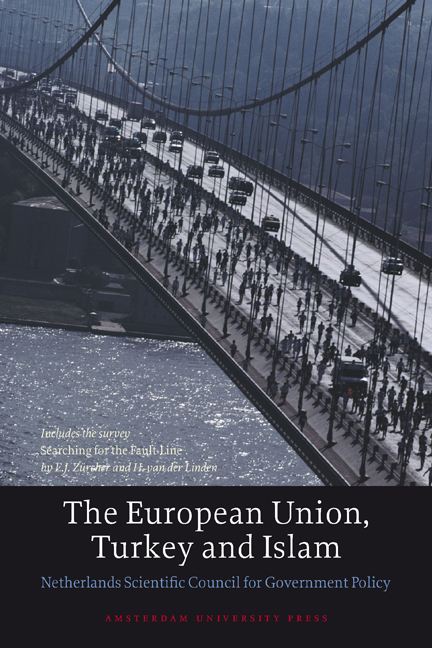Book contents
- Frontmatter
- Contents
- Summary
- Preface
- 1 Introduction
- 2 The European Union and Religion
- 3 Turkish Islam and the European Union
- 4 Conclusions
- Epilogue
- Literature
- Searching for the Fault-Line
- 5 Introduction: Turkey – Fault-Line, Frontline or Test Case?
- 6 Turkey’S Current Islamic Landscape
- 7 Turkish Islam and the Eu: a Clash of Civilisations?
- 8 Conclusion: Turkish Islam and European Civilisation
- Literature
- Websites
3 - Turkish Islam and the European Union
Published online by Cambridge University Press: 14 January 2021
- Frontmatter
- Contents
- Summary
- Preface
- 1 Introduction
- 2 The European Union and Religion
- 3 Turkish Islam and the European Union
- 4 Conclusions
- Epilogue
- Literature
- Searching for the Fault-Line
- 5 Introduction: Turkey – Fault-Line, Frontline or Test Case?
- 6 Turkey’S Current Islamic Landscape
- 7 Turkish Islam and the Eu: a Clash of Civilisations?
- 8 Conclusion: Turkish Islam and European Civilisation
- Literature
- Websites
Summary
INTRODUCTION
Many arguments against Turkish EU membership assume that ‘Islam’ and ‘Europe’ are two different entities that are historically only distantly related. Such arguments usually see Muslims as a new group of postwar immigrants and their immediate descendants, who have increasingly appeared as adherents of Islamic fundamentalism. Such views embrace crude generalisations, in which the West and Islam are synonymous for separate civilisations that are basically incompatible. According to Samuel Huntington (1993, 1996), it is exactly between these two ‘civilisation blocs’ that armed conflicts will increasingly occur. His hypothesis confirms the characterisation of Muslims as a single group of traditional and possibly fundamentalist believers, antagonistic to the West. Islam appears as an antidemocratic religion, opposing, among other things, the separation of the state and religion. Muslims would like nothing better than to reverse this separation wherever it exists, and to introduce the shari’a, the Islamic law. From the perspective of this ‘clash of civilisations’, a Muslim country like Turkey can never be part of the EU, at whose core lie the values of democracy, respect for universal human rights and the rule of law.
This chapter examines how, since the founding of the modern state, Turkey has interpreted the secular democratic constitutional state, both formally and actually. It begins by examining how far the secular state is historically embedded in Turkey (section 3.2). It then explores how, since the 1950s, the Turkish state has dealt with the rise of explicitly Islamic political movements (section 3.3), as well as the attitude of Turkish state-Islam towards the freedom of religion (section 3.4). Finally, the chapter explores the relationship between, political Islam and, in turn, democracy, human rights and violence (sections 3.5, 3.6, and 3.7 respectively).
THE SECULAR STATE: HISTORICAL FOUNDATIONS
Historically, the area we now regard as Europe has virtually always been home to Muslims. There has been a century-long Muslim presence in Greece, and for long periods the Ottoman Empire occupied an area most people now regard as European territory. Europe's relationship with the Ottoman Empire, with present-day Turkey at its centre, was marked by long intervals of hostility and warfare. These form the basis of Europe's deep-rooted hostile image of Islam, an image that, incidentally, reinforced the construction of Europe's own identity (Zemni 2002).
- Type
- Chapter
- Information
- The European Union, Turkey and Islam , pp. 45 - 66Publisher: Amsterdam University PressPrint publication year: 2004
- 1
- Cited by



